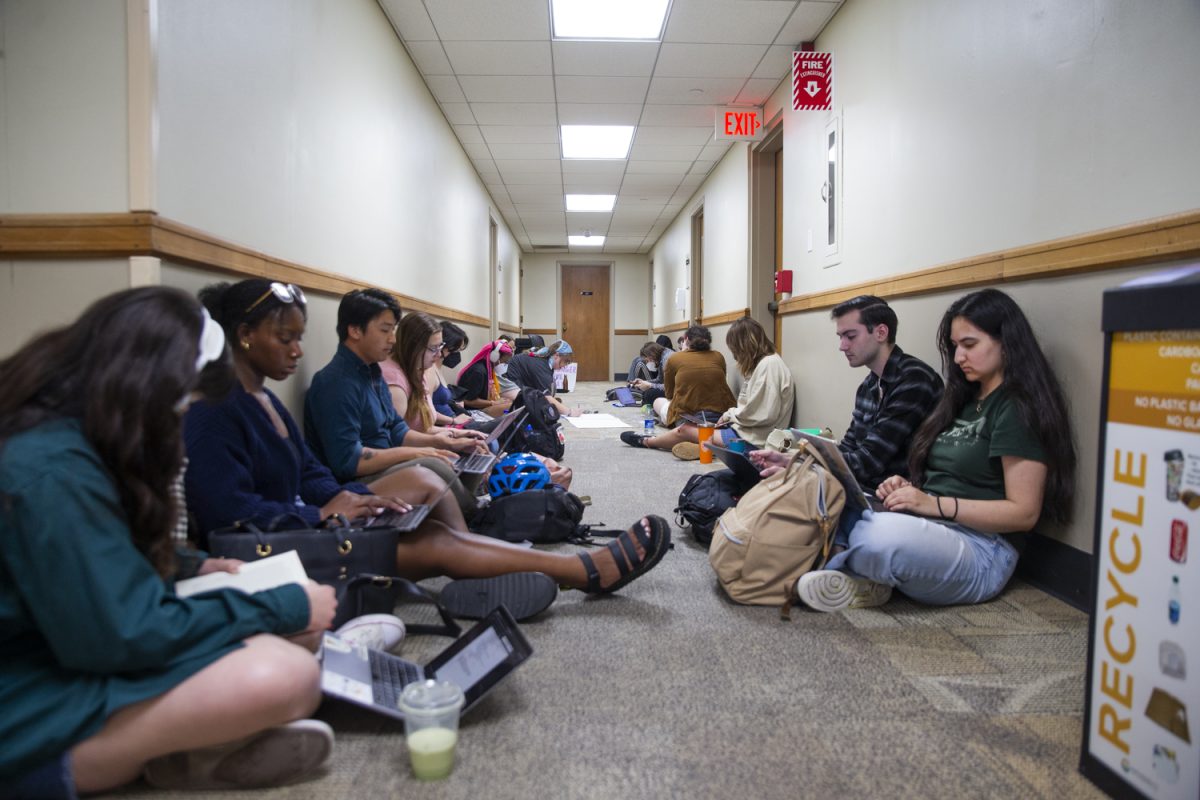Amid changes to the manual of policy and procedures in the University of Iowa College of Liberal Arts and Sciences, some professors have presented concerns about the revisions that will affect faculty and staff across the board.
These changes include making the co-chair of the assembly the College of Liberal Arts and Sciences’ Dean.
The College of Liberal Arts has four groups that advise Dean Sara Sanders, including the executive committee, the faculty assembly, Undergraduate Educational Policy and Curriculum Committee, and the Graduate Educational Policy Committee.
American Association of University of Professors UI chapter President Ann Rhodes, who is also a UI clinical professor, said these changes will significantly impact non-tenured, instructional track, and clinical track faculty, as it would diminish their voices in decision-making during faculty assembly.
Non-tenured faculty members and clinical track faculty members do not have the protection of tenure, Rhodes said, meaning their positions at the university are constantly at risk.
The UI wrote in an email to The Daily Iowan that the CLAS Dean and executive committee have worked to draft revisions that “clarify roles and duties, improve transparency, and better align with institutional practices.”
The statement also emphasized that the faculty assembly’s role is frequently misunderstood and that the revision makes its existing role clearer.
“Its role is consistent with the university’s other shared governance bodies,” the statement said.
In regards to the co-chair, the statement said the dean is valuable for all faculty and lecturers, not just those in leadership positions with the goal being to maintain active, ongoing communication with the dean’s office and reiterate the college’s commitment to shared governance. The faculty assembly, if necessary can meet without the dean present.
“These revisions strengthen the shared governance process, the values that have guided all our work together in CLAS, and elevate the voice of all our faculty. “We encourage faculty to vote yes,” the statement said.Rhodes said instructional track faculty, in particular, are dependent on the dean reappointing them, saving their position as a faculty member at the university.
Appointing the dean to co-chair of the faculty assembly would cause instructional track faculty members to feel less willing to speak up, Rhodes said.
“They would be concerned about speaking freely as their jobs may be jeopardized if they disagree with [the dean],” Rhodes said.
“They would be concerned about speaking freely as their jobs may be jeopardized if they disagree with [the dean],” Rhodes said.
Former law professor and current member of the AAUP Lois Cox said that it has always been a goal of the AAUP to ensure that the decisions being made within the university are dependent on the faculty members.
Shared governance, Cox said, is a time-honored method of university and collegiate operation that focuses on the content and delivery of education.
“We saw these proposed changes as removing some of that decision-making power for the faculty assembly,” Cox said.
Cox said if these proposed changes were implemented, the collective judgment of the faculty, which is expressed through the faculty assembly, would decrease.
“If individuals are worried about speaking out in fear of retribution, the automatic power of the faculty assembly will be diminished,” Cox said.
AAUP policy, Cox said, is based on the belief that faculty who have developed expertise in their specific subject matters and in their delivery of that education are in the best position to determine how to convey that knowledge to students.
“The faculty is going to have less input in the educational process, and we believe that would come back to hurt the students because they are not getting the benefit of the faculty’s years of experience,” Cox said.
Loren Glass, chair of the English Department and former president of the AAUP, said there are points of concern in the proposed changes he believes faculty should look into before they vote.
“My own feeling is that the revised details don’t directly violate any AAUP recommendations, but they do alter shared governance in ways that faculty should be aware of,” Glass said.
He urged faculty members to carefully read the materials the dean’s office has provided so they can decide for themselves whether to adopt the proposed changes.
“I think the faculty now has a chance to make an informed decision about whether they think these are the most appropriate revisions to be made,” Glass said.
Faculty members will vote on the proposed changes on Jan. 25 through Feb. 15.
“Iowa has a really strong tradition of faculty governance and shared governance that works pretty well here,” Rhodes said. “It is alarming to see efforts to reduce that.”
Bob Cargill, UI associate professor and director of undergraduate studies, wrote in an email provided to the DI that having the dean of CLAS as the co-chair of the faculty assembly would mandate that she remain attentive to the wishes of the Faculty Assembly.
“Once again, the minority of faculty objecting to this change are the same individuals who often object to what they feel is an administrative infringement on what they feel should be the unrivaled authority of the FA,” Cargill wrote in the email.
Cargill wrote in an email shared governance means that faculty should work together with the administration and that faculty assembly members should vote in the affirmative for the proposed revisions.
“I would also hate to risk the positive standing we presently hold with the administration by voting against these simple, reality-reflecting revisions, solely because an organized handful of faculty members have been (often anonymously) attempting to rally a vendetta campaign against the administration,” Cargill wrote in the email.
Correction: A previous version of this article stated that the proposed changes to the Faculty Assembly include “changing the role of the faculty assembly” but the role of the faculty assembly is not changing. The previous article also stated that there are two faculty advisory groups, but there are actually four. The Daily Iowan regrets this error.









